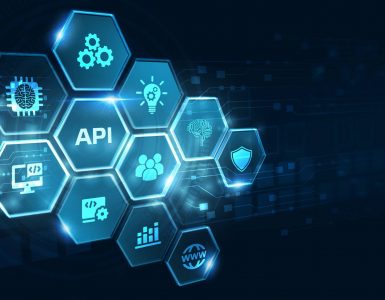With currently over 1.8 billion websites registered and counting, the ticker moves faster than a clockʼs seconds hand. Of these, it is estimated that less than 25% are currently active, leading us to a still eye-catching figure of about 400 million active websites. To keep these websites up and running, while looking pretty, is the job of the frontend, backend, or full-stack developer. The programming and technology that refers to the server-side of an application, is called backend.
The backend of any application, also known its brain, involves communication between servers, databases, and applications (or browsers). It is the backend developerʼs responsibility to ensure that these three components communicate seamlessly with each other to facilitate the user-facing side of the websites.
A backend developer needs to be proficient with several tools and skillsets to be great at their job, as seen in highly skilled developers. When it comes to highly functional mobile application or website application with heavy payload such as Netflix or Amazon, concepts of new generations are brought in to ease the workflow and enhance the availability of content provided by any service. Such concepts include publisher-subscriber model, queuing, messaging, sockets, etc. As development team size grows, involved developers goals include speed, data integrity, and support for distributed, non-linear workflows.
A basic understanding is required for how application will communicate to its backend. REST, GraphQL, gRPC, sockets, etc are some widely used communication practices. Security of data communication between systems is essential part of backend. Without it, data breaches are common making any application vulnerable.
Below are some typical skills a backend developer must possess:
- Server-Side Languages & Frameworks: Ruby, Perl, Python, PHP, Node.JS, Angular, .Net, ASP.Net
- Database Skills: MySQL, Oracle, NoSQL, MongoDB or PostgreSQL
- Others: Apache, Nginx, Docker, Kubernetes, Git, OAuth, etc.
Given that there is such a large scope for discussion in an interview, candidates need to prepare for and be ready to answer certain questions with flair and confidence. Below is a list of 9 questions, which backend developers should be prepared to answer.
1. How would you manage Web Services API versioning?
Versioning is a critical part of API design, as it gives developers the ability to improve their API without stopping the clientʼs applications whenever new updates are rolled out. The three types of API versioning are:
- URL Versioning or Route Versioning: This solution uses URI routing to point to a specific version of the API.
- Versioning using a custom header: REST APIs are versioned by providing custom headers with the version number included as an attribute.
- Query String Parameter: Considered to be the worst method, the version number is included as a query parameter.
2. How would you find the most expensive queries in an application?
Expensive queries are database queries that execute very slowly or utilize large amounts of CPU or memory resources. These queries are the most common cause of performance issues in an application.
SQL Activity Monitor is an easy and rich UI tool available in the SQL Server Management Studio. You can also use SQL Dynamic Management View (DMV) to view the most expensive queries.
3. What is CAP Theorem?
CAP stands for the attributes of Consistency, Availability, and Partition Tolerance. The CAP Theorem is a concept according to which, a distributed database system can have only two of the three mentioned attributes. It is useful to determine the choice of data manipulation tools used in Big Data, based on each unique use-case.
CAP Theorem is like the old joke about software projects: you can have it on TIME, in BUDGET, or CORRECT. Pick any two.
4. When would you apply asynchronous communication between two systems?
In asynchronous communications, the client sends a request to the server (typically requiring lengthy processing), while receiving a delivery acknowledgment immediately.
After the client receives the acknowledgment, it carries on with other tasks and will be notified eventually when the server finishes processing the request. The main benefit of asynchronous communications is improved performance.
Asynchronous communications can be applied in situations where the response is not required immediately, and the current process can continue without the response. Real-world examples can include email, Slack, and other messaging platforms.
5. In what situation would you choose RDBMS and where would you choose NoSQL?
An RDBMS is used when you need ACID (Atomicity, Consistency, Isolation, Durability) compliance to reduce anomalies and protect data integrity and when the data is structured and unchanging.
On the other hand, NoSQL is recommended for high volume environments, cloud computing & storage, and when using unstructured data. Examples of NoSQL databases are MongoDB, Cassandra, HBase, and CouchDB.
6. What is an MVC framework?
A Model-View-Controller is a software design pattern that separates an application into three logical interconnected components – the model, the view, and the controller. It is used to organize the code into simple organized components. MVC helps in letting your code interact with another developerʼs code, based on their functions.
7. Which sorting algorithm to use and when?
- Quick Sort: is one of the most efficient sorting algorithms. It is based on the splitting of an array or list into smaller ones and swapping values based on the comparison with the ‘pivot’ element selected. It is more effective for data that can fit in memory. Otherwise merge sort is preferred.
- Bubble Sort: The simplest but most inefficient sorting algorithm, it repeatedly cycles through a list, compares adjacent values, and swaps them if they are in the wrong order. It is mostly used when array is small or if large data which is nearly sorted.
- Selection Sort: It is a fast and simple comparison-based sorting algorithm. It sorts by finding the minimum element repeatedly in an array. It is mostly used when an array is small as its time complexity makes it inefficient for larger arrays.
- Merge Sort: One of the most efficient algorithms, it uses the principle of divide and conquer. It iteratively breaks down lists into sub-lists consisting of single elements and then merges these elements as per the requirements. Widely used in case of linked list or where the known data is similar.
8. What are the qualities any good backend developer must possess?
This is a great question with which to impress the interviewer, as you can tell them about your competencies and understanding of the position. However, many candidates make the mistake of only talking about a couple of their strengths. The ideal answer should include at least some of the following points:
- In-depth knowledge of server programming languages like Python, Ruby, Java, Perl
- Great acquaintance with NoSQL and RDBMS
- Good understanding of front-end technologies (easy to work with frontend developers)
- Basic understanding of cloud deployments
- Ability to develop business logic within any app
- Ability to easily create functional APIs
- Design of service architecture
- Ability to optimize web applications
9. What do you find hardest about coding?
This question is designed for the interviewer to find out about your weaknesses or technical deficiencies. It is best to give an honest answer (without beating yourself up too much) about a specific area that might not be your strong point. What is more important is to let the interviewer know that you are improving yourself by learning, reading, or researching to upgrade your technical skills.
Backend development is an immense topic, and the above list of interview questions is only the tip of the iceberg. Use this list as a reference, after doing your research on the basic questions asked in an interview for backend developers.
If you are looking for a backend developer position, you can also empower your job search by signing up on Talent500 – a talent discovery platform to get placed with Fortune 500 companies and top MNCs globally.






Add comment